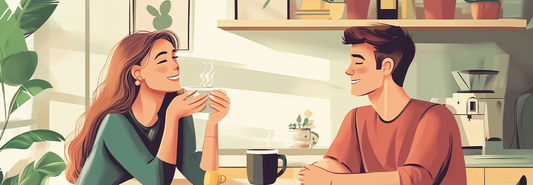
Bittersweet Belonging: Why Coffee Shops Feel Like Home Around the World
The Unspoken Comfort of a Café
There’s a certain kind of comfort that wraps around you the moment you step into a café — the hum of conversation, the clatter of ceramic cups, the soft scent of roasted beans hanging in the air like a warm memory. It’s not just about the coffee. It never was. Around the world, cafés and coffee houses have quietly become extensions of home, even for those who are far from theirs.
Whether it's the corner coffee shop where you scribbled your first novel draft or a Parisian terrace where strangers whisper in soft French murmurs, coffee spaces hold a strange and beautiful familiarity. From Indian chai stalls to Brooklyn espresso bars, they all carry the same emotional thread: you belong here.
Cafés: Where Culture Meets Community
For centuries, cafés have served as sanctuaries of connection. In 17th-century Vienna, they were the meeting points for intellectuals and revolutionaries. Today, in places like Seoul, they’re designed for curated social experiences where coffee is just the excuse to linger. Even now, in a digital-first world, we find ourselves seeking these spaces — not because we need caffeine, but because we crave presence.
These aren't just places to drink. They’re spaces to feel. To think. To sit quietly or speak loudly. To meet others or meet yourself.
The Global Soul of Coffee Spaces
In every corner of the globe, cafés reflect the spirit of their people. Istanbul’s kahvehane invites storytelling over strong brews. Tokyo’s kissaten cafés blend quiet introspection with vinyl jazz. Nairobi’s coffee houses buzz with business energy and youthful ambition. Though different in flavor and function, they all serve one purpose — to connect human experience through coffee.
Each culture leaves its fingerprint on its cafés. But the emotional architecture remains the same: comfort, belonging, and something deeply human.
Alone, Not Lonely: The Psychology of the Café
There’s an unspoken rule when you enter a café: you’re free to just be. Whether you're a writer deep in flow, a student lost in revision, or a traveler catching breath between moments — cafés make room for your story.
This is what makes them feel like home. You’re allowed to be alone without being lonely. You can exist in public without performance. That small table by the window? It holds space for your thoughts, your pause, your process.
Coffee and Memory: A Brewed Nostalgia
What makes a café so emotionally sticky? Often, it’s nostalgia. The smell of ground beans may remind you of your grandfather’s kitchen. A creaky sofa in the corner might feel like your childhood living room. Sometimes, the memory isn’t specific — just a soft ache that says, you’ve been here before, even if you haven’t.
That’s the magic of coffee shops. They give us more than warmth in a cup — they give us pieces of ourselves, gently reflected back.
The Modern Café: Sanctuary in a Fast-Moving World
As life accelerates, the café remains a slow ritual. In the post-pandemic world, they've evolved into liminal spaces — not quite home, not quite work, but something softer and in-between. Co-working cafés, plant-filled corners, curated playlists — it’s less about sipping and more about settling. For an hour. For a breath.
And maybe that’s why, even in the age of remote everything, coffee shops still pull us in. We don’t just need a beverage. We need a break that feels human.
More Than Coffee — A Place to Belong
Cafés are where heartbreaks are processed, and ideas are pitched. Where birthdays are celebrated and silence is shared. They don’t demand anything from us — yet give us everything we need: warmth, familiarity, and a quiet sense of connection.
Around the world, they speak the same language of belonging — even if the accents vary.
So maybe it’s not just the coffee that draws us in. Maybe it’s the bittersweet blend of comfort and community. And maybe, just maybe, that’s why every café, anywhere in the world, feels like home.





